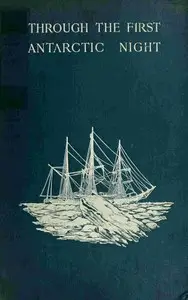"Through the First Antarctic Night, 1898-1899" by Frederick A. Cook, M.D. is a historical account written in the late 19th century. The narrative chronicles the expedition of the Belgian Antarctic ship, the "Belgica", which explores uncharted territories around the South Pole during an entire year of polar darkness. The book provides an in-depth look into the challenges and experiences faced by the expedition members, highlighting both scientific observations and the personal dynamics among the crew. The beginning of the narrative sets the stage by introducing Cook's personal motivations and the preparations for the "Belgica" expedition. As Cook awaits the ship's arrival in Rio de Janeiro, he reflects on his excitement and anxiety about embarking on a journey into the unknown. The introduction also outlines the expedition's goals and members, emphasizing the scientific mission and the camaraderie among a diverse crew. As they prepare for their polar voyage, the contrasting elements of tropical warmth and impending icy desolation are vividly depicted, drawing the reader into the anticipation of exploration and adventure. (This is an automatically generated summary.)

Through the first Antarctic night, 1898-1899 : $b a narrative of the voyage of the "Belgica" among newly discovered lands and over an unknown sea about the south pole
By Frederick Albert Cook
"Through the First Antarctic Night, 1898-1899" by Frederick A. Cook, M.D. is a historical account written in the late 19th century. The narrative chro...
Frederick Albert Cook was an American explorer, physician and ethnographer, who is most known for allegedly being the first to reach the North Pole on April 21, 1908. A competing claim was made a year later by Robert Peary, though both men's accounts have since been fiercely disputed; in December 1909, after reviewing Cook's limited records, a commission of the University of Copenhagen ruled his claim unproven. Nonetheless, in 1911, Cook published a memoir of the expedition in which he maintained the veracity of his assertions. In addition, he also claimed to have been the first person to reach the summit of Denali, the highest mountain in North America, a claim which has since been similarly discredited. Though he may not have achieved either Denali or the North Pole, his was the first and only expedition where a United States national discovered an Arctic island, Meighen Island.














